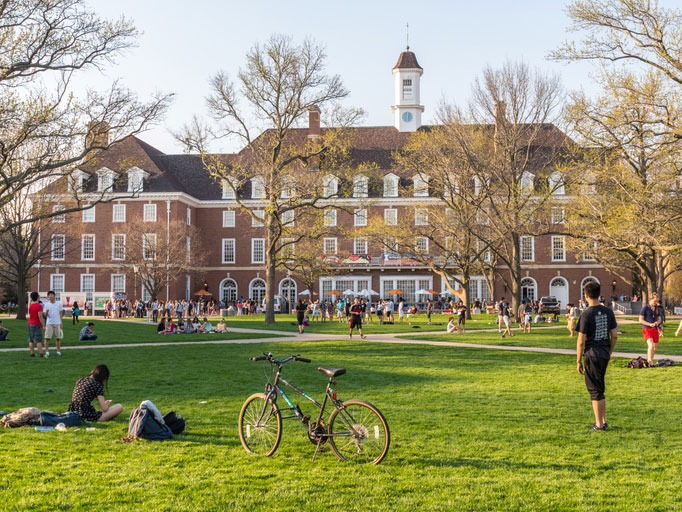
A bachelor of liberal arts has a special place in preparing the professional workforce. In any field, a four-year bachelor’s degree is your ticket to entry-level professional positions. Interested in becoming a management analyst? Don’t bother posting that application without a bachelor’s degree on it. How about a PR position? Even low-end public relations specialists need a four-year education to get started.
The reason most employers in the professional world set the bar for most jobs at a bachelor’s degree at minimum isn’t because of the field-specific knowledge or skills that degree offers. Instead, it’s because they value a different quality that college graduates come with – the ability to think critically.
Those critical thinking skills spring from the fact that modern colleges structure their degree programs around the ancient educational tradition of liberal arts. And a liberal arts degree is centered more in that tradition than any other.
Sponsored School(s)
A Bachelor’s Degree in Liberal Studies Gives You the Well-Balanced Skillset the Professional World Expects
Liberal arts have been the basis for Western education for thousands of years. It’s a tradition that values dialogue, curiosity, and a broad combination of fields of study. You learned math, English, history, science, social studies, and had art classes throughout your elementary and high school years because of the liberal arts emphasis on general knowledge, thinking skills, and creative problem solving. And any bachelor’s degree will almost certainly require a similar interdisciplinary course of study.
But you can take a liberal arts education, and those qualities of critical thinking and analysis, one step further than the standard field-specific bachelor’s degree. Some liberal arts colleges today offer bachelor’s degrees in the liberal arts themselves. A full dose of the kind of broad-based, investigative, creative training that other degrees only touch on.
How To Pick The Best College For Your Bachelor of Liberal Studies

Liberal arts colleges tend to have smaller enrollments, with fewer students per class, offering more interaction and more attention from professors. They place a higher value on the spirit of learning than on basic research and scientific discoveries.
The Carnegie Classification of Institutes of Higher education lists:
- 241 undergraduate degree-granting American universities in 2021 with a focus in arts and sciences.
- Another 334 offer arts and sciences programs in combination with professional studies.
That adds up to just about a quarter of the total number of four-year schools the National Center for Education Statistics (NCES) accounted for in 2020.
Deciding which one of those is the best option for your bachelor of liberal studies program is an intensely personal choice. Every school will have strengths and weaknesses; different programs will have different concentrations and reputations.
Online Degrees May Be Your Best Choice for a Bachelor of Liberal Studies

When you think tradition and college, online degree programs aren’t usually the first thing to come to mind. As a result, many students don’t really realize that earning a bachelor of liberal arts online could be the best option for them.
When you really think about it, you’ll realize that online degree programs are a perfect fit for the rational, independent path of liberal studies. That’s because they offer unparalleled freedom in how and when you choose to engage with your coursework.
A conventional liberal arts class might involve sitting down at a certain place and time every week with your professor and classmates for discussion. That fulfills all the expectations of a dialogue-based education, but it also places demands on when and where you can have those discussions.
Consider the online alternative. Maybe your class interacts through a real-time videoconferencing stream. You still have to commit to a particular time, but suddenly your location doesn’t matter at all. You save travel time, you can even live in a different city if that’s your preference.
But with the proliferation of asynchronous scheduling options online message boards can be a proxy for in-class interactions. Now you can contribute to a discussion at your kitchen table at midnight if that’s when inspiration strikes.
Online programs often cost less, because they don’t have to pay for that classroom space and all the associated expenses. They also give you options to look at schools far and wide that you might not otherwise have considered. If you find a program that is the perfect fit halfway across the country, you no longer have to rule it out.
The Very Idea of a Liberal Studies Degree Implies Choice and Variety in Your Curriculum
Talking about a liberal arts curriculum means going broad. There’s no one standard fit. In fact, even students studying for the same BLS (Bachelor of Liberal Studies) degree at the same university might end up graduating with wildly different classes on their transcript.
Most schools that offer bachelor’s degrees in liberal arts encourage students to put together their own courses of study.
Working with advisors and professors, you will sit down with the college catalogue and come up with a unique, perfectly focused set of courses that will give you the kind of intensive exploration you are looking for in the subjects that interest you most.
If there is one thread connecting all bachelor of liberal arts curriculums, it is breadth. You won’t spend all your time in one department on campus. Instead, you’ll be exposed to a wide variety of experts in a mind-blowing range of different subjects. Those will almost always include courses in:
Sciences
Science and math don’t always spring to mind when you’re thinking about liberal arts coursework, but modern math and science wouldn’t exist without liberal studies! In the same way, you won’t find a liberal arts bachelor’s program that doesn’t require you to develop your understanding of the natural world, and your understanding of math and statistical principles.
Social Studies
History and society are the fabric against which all other discoveries, innovations, and principles are measured. That means liberal arts majors should expect to have a strong course of study in the history of the world and in the societies and cultures that have been shaped by historical events.
Art and Literature
As you study history and culture, you’ll find that those things are defined by the creative and expressive works that emerge from them. So, classes in art and art appreciation, in reading and understanding literature, or even in developing your own creative skills will be part of a bachelor of liberal arts degree.
Language
Languages are the key tool that humans use to express, inquire and communicate thoughts. Since communication skills are a big part of a liberal arts education, most bachelor’s programs require some study of foreign language as a requirement.
Philosophy
When you boil it all down, liberal arts degrees are largely courses of instruction in how to think. And philosophy is the study of the fundamental nature of knowledge and thought, so you better believe you will be taking some courses in logic and rational thinking. These could take the form of studying the history of philosophy and human thought, going back to those Greek creators of the liberal arts tradition, or rigorous classes in logic itself, teaching you how arguments are made and proved in discussion and in writing.
Unlike more traditional bachelor’s programs, a BLS degree won’t necessarily come with a specific set of classes to fulfill in each of those areas. Instead, you’re encouraged to think outside the box, and find courses to fulfill those requirements that you and your instructors agree fit with your overall learning goals.
The Concentration You Choose Makes Your Bachelor of Liberal Studies Program Complete
Although the core curriculum for a BLS degree is definitely going to cover the full spectrum of liberal studies, most of the time you will also pick a concentration. These focus areas offer a set of classes similar to what you would find in a traditional bachelor’s program in that major. An economics concentration, for example, will include micro- and macro-economics courses, classes in international trade theory, and labor economics, just like a full-on bachelor’s in economics.
The big difference is that in the economics major, you would find most of the emphasis placed on those classes in a defined course of study. Sure, you’d get some electives, but for the most part you’d be trudging along the same path as every other econ student at any university.
With a BLS economics concentration, for example, your curriculum gets tailored to your interests. And it gets fleshed out not with more economics coursework piled on top, but with diverse classes in topics that show economics from the outside… the literature of Marx, deconstructing capitalist theory, maybe, or readings from Dickens as he shines a light on the effects of industrialization and poverty in urban society.
You don’t just learn about the topics relevant to your concentration—you learn how those topics fit into the world around it.
Because of this flexibility and broad application of liberal studies, you can find an enormous range of concentrations available in bachelor of liberal arts programs. Some of the most common options include:
- History
- Languages
- Art (History, Music, Theater, Studio)
- Writing
- Gender Studies
- Environment
- Legal Studies
- Education
- Psychology
- Architecture
The list is endless! But as if those aren’t enough, many colleges will also allow you to come up with your own concentrations and develop a course of study unique to your own interests and ideas too.






